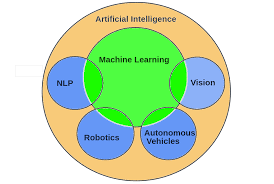60 Ways to Learn the Types of Artificial Intelligence (AI): A Beginner’s Guide (2024 Edition)

60 Ways to Learn the Types of Artificial Intelligence (AI): A Beginner’s Guide (2024 Edition)

Introduction
Artificial Intelligence (AI) is one of the most transformative technologies of the 21st century, influencing everything from healthcare to entertainment. For beginners, understanding the different types of AI—Narrow AI, General AI (AGI), and Superintelligence—is essential to grasp the current landscape and future possibilities of this powerful field. This guide will explore 101 ways to learn about the types of AI in 2024, offering diverse methods and resources to help you on your AI learning journey.
Overview
Artificial Intelligence can be classified into three main types:
- Narrow AI: Also called Weak AI, it specializes in performing specific tasks like voice recognition or image classification. Examples include Siri and Alexa.
- General AI: Artificial General Intelligence (AGI) refers to machines with human-like intelligence that can perform a wide variety of tasks. AGI remains theoretical but is a key research focus.
- Superintelligence: This is a futuristic AI that surpasses human intelligence. It's more speculative but central to discussions about the long-term future of AI.
Each type of AI has different capabilities, challenges, and potential impacts on society.
Importance of Learning AI Types
Understanding the types of AI is crucial for several reasons:
- Practical Applications: Learning about Narrow AI helps in grasping everyday technologies like search engines, virtual assistants, and AI-powered applications.
- Future Preparedness: Gaining knowledge about AGI and Superintelligence allows you to anticipate future trends and their impact on society, jobs, and ethics.
- Career Opportunities: The AI field is growing rapidly, and having foundational knowledge opens doors to various careers, from data science to AI ethics.
- Informed Decision Making: As AI becomes more integrated into governance, healthcare, and business, understanding its types helps in making informed personal and professional decisions.
Artificial Intelligence (AI) is a vast and evolving field. For beginners, understanding its types is key. Here's a guide to help you master the topic from different angles:
1. Read Beginner-Friendly AI Articles
- Start with articles explaining AI types (narrow, general, and superintelligence).
- Resource: Medium, Towards Data Science.
2. Follow AI Blogs
- Follow AI enthusiasts and experts who explain different types of AI.
- Blog examples: AI Alignment Blog, AI Ethics.
3. Take Online AI Courses
- Coursera: Introduction to AI for beginners.
- EdX: AI Basics for Everyone.
4. Watch YouTube Tutorials
- Channels like Two Minute Papers simplify AI concepts.
5. AI Podcasts
- Listen to AI-focused podcasts.
- Examples: Lex Fridman Podcast, The AI Alignment Podcast.
6. Download AI Apps
- Test out simple AI-powered apps to experience AI in action.
7. Join AI Communities
- Platforms like Reddit's r/MachineLearning or AI Alignment Forum have great discussions on AI types.
8. Read AI Books
- Books like "Artificial Intelligence: A Guide for Thinking Humans" by Melanie Mitchell explain AI types in detail.
9. Play with AI-powered tools
- Use tools like GPT-4 or Google's Teachable Machine to understand narrow AI.
10. Watch Documentaries
- "The Age of AI" by Robert Downey Jr. introduces different AI types.
11. Learn Terminology
- Familiarize yourself with key terms like weak AI, strong AI, AGI (Artificial General Intelligence).
12. Quiz Yourself
- Use online AI quizzes to test your understanding of AI types.
13. Take Notes
- Summarize your learnings from AI tutorials, blogs, and books.
14. Build Simple AI Models
- Learn basic AI model building through tools like Google Colab.
15. Follow AI Twitter Accounts
- Follow AI researchers who explain AI in accessible ways.
16. Join AI Meetups
- Attend local or virtual meetups focused on AI.
17. Watch AI Webinars
- Platforms like DataCamp and O'Reilly offer webinars on AI topics.
18. Participate in AI Competitions
- Kaggle offers competitions to experiment with AI.
19. Subscribe to AI Newsletters
- Stay updated by subscribing to newsletters like AI Weekly.
20. Explore AI Case Studies
- Look at real-world applications of AI to see the differences between types of AI.
21. Use AI-Infused Tools (e.g., AI Writers)
- Write essays using tools like ChatGPT to learn narrow AI capabilities.
22. Take AI Ethics Courses
- Understand ethical considerations of AI types by enrolling in ethics-related courses.
23. Study AI History
- Learn about AI's history to understand the development of its types over time.
24. Visualize AI Types
- Draw or create concept maps showing differences between weak AI, AGI, and superintelligence.
25. Follow AI Research Papers
- Skim through papers like those found on arXiv to gain a deeper insight into AI.
26. Work on AI Projects
- Sites like GitHub offer simple AI project templates for hands-on experience.
27. Join AI Forums
- Engage in discussions on AI forums like AI Alignment to learn through conversation.
28. Watch TED Talks on AI
- TED Talks offer insightful explanations of AI and its future types.
29. Study AI Learning Paths
- Explore structured learning paths on platforms like Udacity.
30. Create AI Learning Groups
- Learn in a group and exchange insights on AI types.
31. Follow AI-related Subreddits
- Subreddits like r/ArtificialIntelligence provide valuable discussions.
32. Explore AI Ethics & Philosophy
- Look into discussions about the impact of AI types in the future.
33. Study Popular AI Algorithms
- Learn the algorithms powering weak AI, such as machine learning and deep learning.
34. Understand Superintelligence Theories
- Explore the hypothetical future of superintelligent AI through books like Nick Bostrom’s "Superintelligence".
35. Study AI Regulations
- Learn how regulations are shaping different types of AI.
36. Use AI Visualization Tools
- Tools like TensorBoard help visualize AI learning.
37. Understand the Differences Between Narrow and General AI
- Create comparison tables outlining the key differences between narrow and general AI.
38. Follow Industry Leaders
- Follow CEOs of AI companies (e.g., OpenAI, DeepMind) to learn about AI's latest developments.
39. Study AI Impact on Society
- Look into how different AI types are influencing industries like healthcare and finance.
40. Use AI Simulations
- Use platforms like AI Dungeon to see AI in action.
41. Compare AI to Human Intelligence
- Study comparisons between artificial and human intelligence to understand the leap from narrow AI to AGI.
42. Listen to AI Debates
- Listen to or read debates on AGI and its potential risks.
43. Create Flashcards
- Use apps like Anki to create flashcards of important AI concepts.
44. Engage in Online AI Workshops
- Attend workshops that explain how different types of AI are applied.
45. Write AI Essays
- Writing about AI types can deepen your understanding of the concepts.
46. Watch AI Tutorials on MOOCs
- Platforms like Pluralsight and Udemy offer introductory AI courses.
47. Break Down AI into Subfields
- Learn about the subfields of AI (robotics, NLP) and where narrow AI fits.
48. Study AI in Movies
- Films like "Ex Machina" and "I, Robot" explore fictional types of AI.
49. Visit AI Exhibitions
- If possible, attend exhibitions showcasing AI advancements.
50. Attend AI Conferences
- Virtual conferences like AI for Good offer great insights into AI advancements.
51. Study AI Game Applications
- Learn about AI applications in gaming, like DeepMind’s AlphaGo.
52. Explore AI Research Groups
- Universities like MIT or Stanford have accessible research portals.
53. Watch AI Experts on Twitch
- Some AI experts stream their work on platforms like Twitch.
54. Create a Simple AI Chatbot
- Learn by building a chatbot using basic NLP models.
55. Explore AI Open-Source Code
- Use platforms like TensorFlow to examine AI models.
56. Explore AI-based Learning Resources
- AI learning paths on LinkedIn Learning can guide your journey.
57. Join AI Slack Groups
- Collaborate with peers in AI-related Slack communities.
58. Study AI’s Role in Automation
- Learn how AI types power automation in industries like manufacturing.
59. Take AI for Beginners Bootcamps
- Bootcamps like those offered by the General Assembly focus on practical AI skills.

